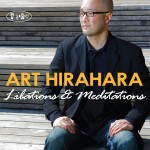ART HIRAHARA
“Libations & Meditations” (Posi-Tone)
We live in an age of riches, at least where the subject concerns working jazz pianists. You could stick with established names, many of them playing as well as ever, and feel abundantly fulfilled. Or you could focus on new arrivals, still in their 20s, and savor a sense of discovery. What you’d miss either way is the possibility of an astute, well-traveled pianist making a breakout statement — like the one by Art Hirahara on “Libations & Meditations,” his thoughtfully assured new album.
Mr. Hirahara, just shy of 44, has been a workhorse on the New York jazz scene for more than a decade, since moving from the San Francisco Bay Area. A graduate of the Oberlin Conservatory of Music and the California Institute of the Arts, he brings a broad base of knowledge to his enterprise: electronic composition, West African music, Balinese gamelan, multiple strains of the avant-garde. But his dialogue with the jazz tradition on this album isn’t inherently radical or envelope-pushing; it often sounds respectfully at ease, without being hemmed in by convention.
And his sturdy trio, with Linda Oh on bass and John Davis on drums, works just as convincingly with hard-swinging momentum (in parts of “Bop Bim Be” and its partner track, “Be Bim Bop”) as it does with minor-key crescendo building (“Big Country”) and dirgelike semi-abstraction (“Dead Man Posed”).
There’s a back story to the original material, involving the death of Mr. Hirahara’s father in 2011, but it was surely more useful to the creation of the compositions than to any understanding of them. (Mr. Hirahara’s trio will perform this music on Feb. 16 at Smalls.)
Whatever the case, Mr. Hirahara’s instincts as a composer are sensible and clear, and he isn’t too serious to acknowledge some standard influences: “With Two Ice Cubes,” the opener, is a syncopated slalom through the form of Cole Porter’s “What Is This Thing Called Love?,” and “Only Child” is a Bill Evans piece played with a fondness approaching deference.
The only other nonoriginal is “Karatachi No Hana,” a Japanese standard (by the composer-conductor Kosaku Yamada) that Mr. Hirahara imbues with an air of churchlike solemnity, as in a hymn. Playing unaccompanied, with a patient cadence and an impeccable touch, he creates a moment at once personal and unabashedly artful. NATE CHINEN
